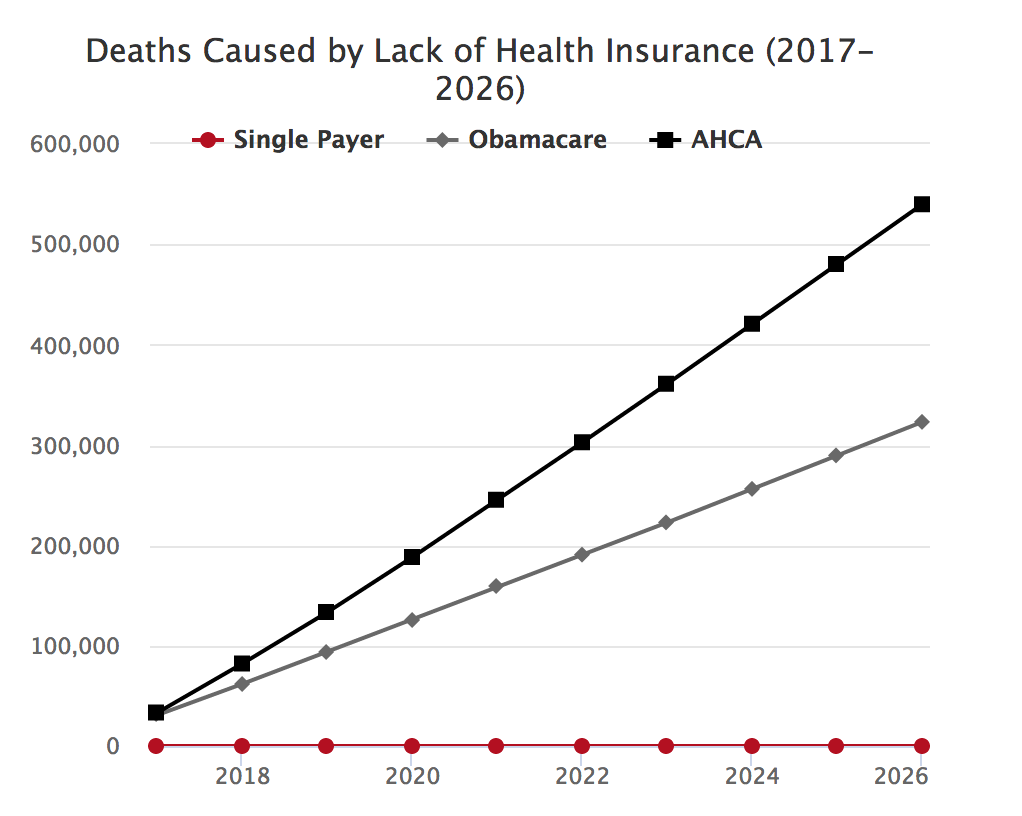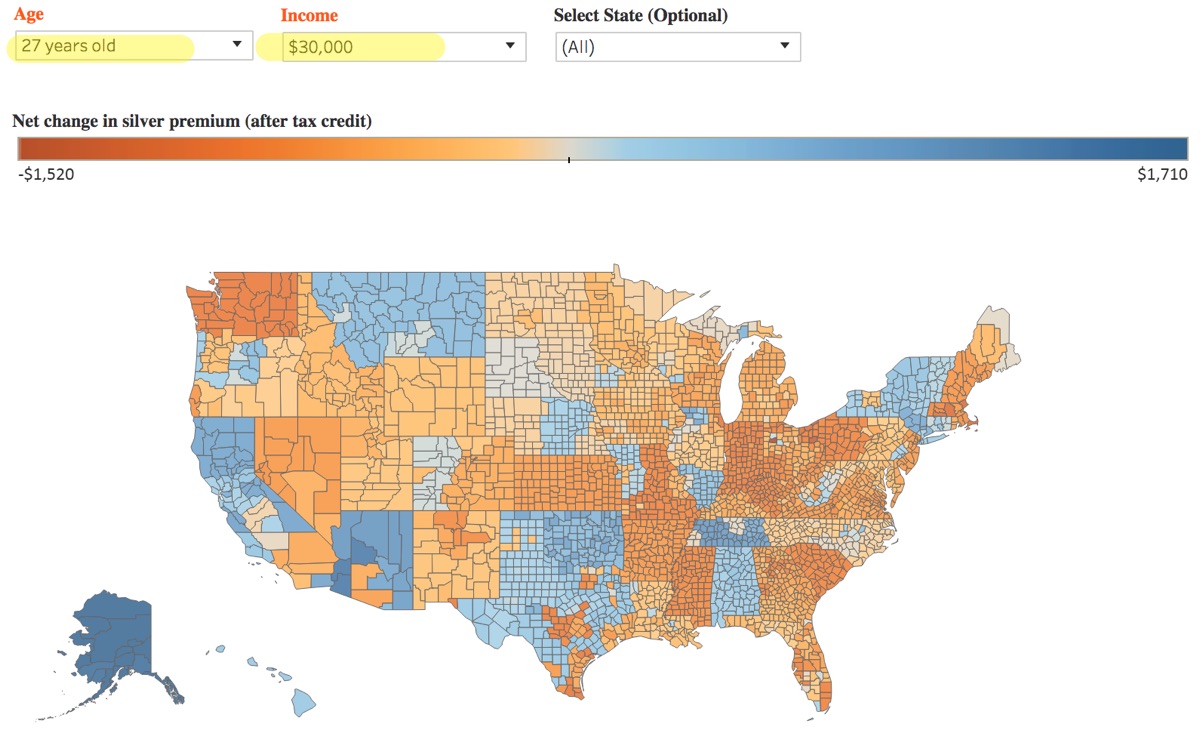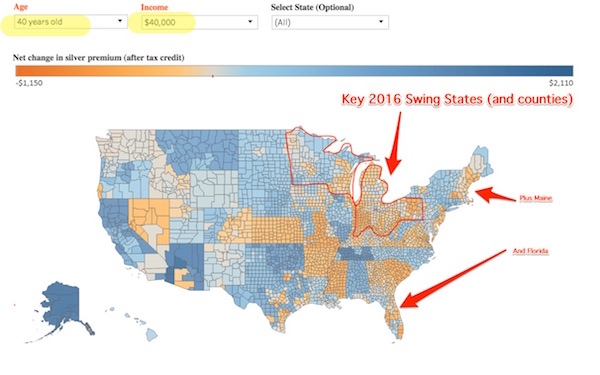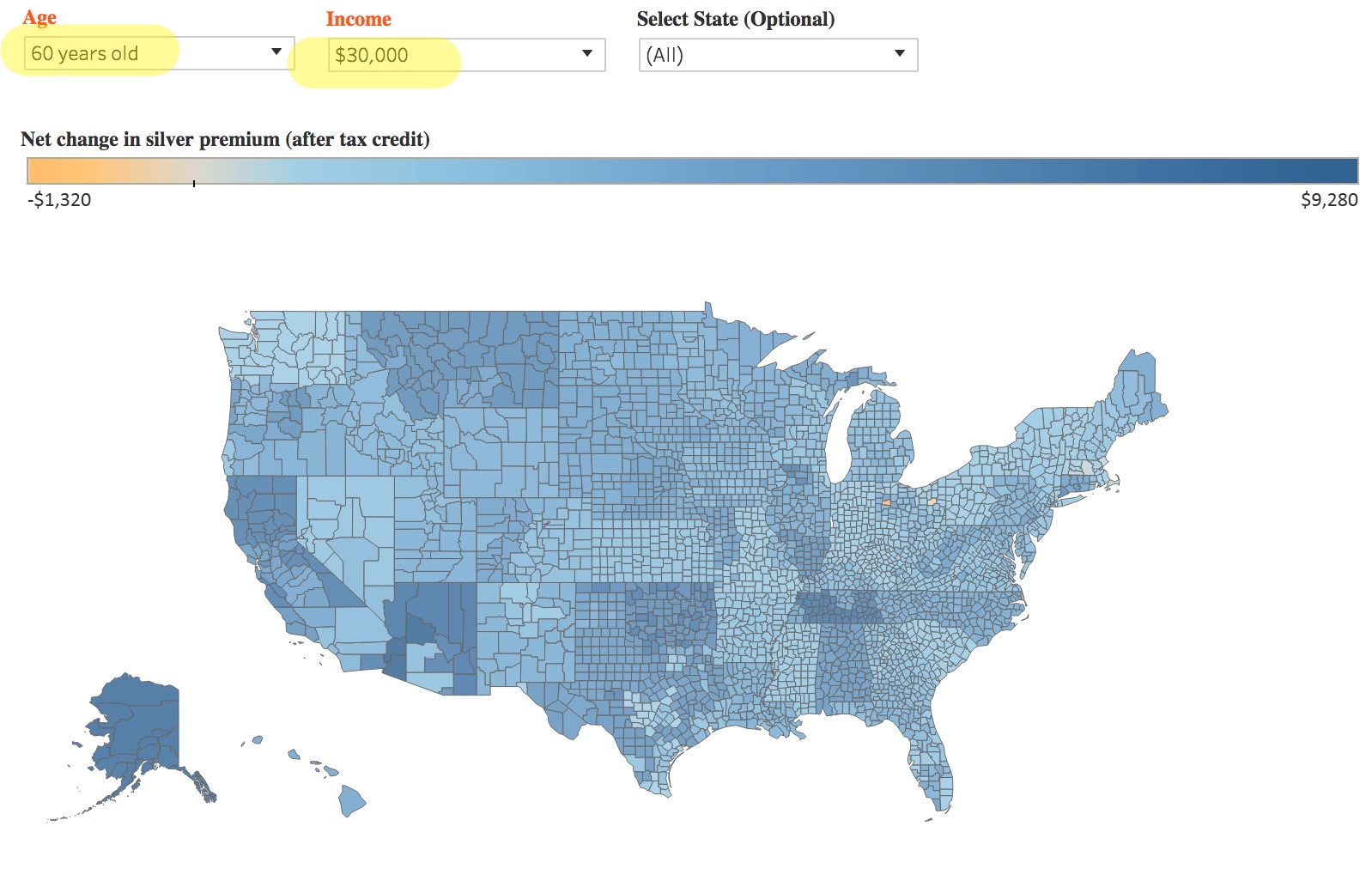By Lambert Strether of Corrente.
There’s been a lot of wonkish analysis about how bad this Republican health care bill is — they called it Better Care Reconciliation Act (BCRA), if you can believe it — and it is bad, but there’s been very little analysis about why the Senate bill is structured as it is, other than Republicans are mean. Before moving on, let me dispose of the partisan conflict by reposting Matt Bruenig’s chart and interpretation:

Under AHCA, nearly 540,000 people will die in the next decade because of lack of health insurance coverage. For Obamacare, it is a more respectable 320,000 deaths.
In other words, what we have in this week’s battle is a struggle between the two major parties about how efficiently to implement Rule 2 of Neoliberalism. I’m waiting for the liberal Democrat explanation of why 540,000 deaths are bad, but 320,000 deaths are jake with the angels, when there’s a 0-deaths alternative available. Until we get one, liberal Democrats have no standing for virtue signaling whatever.[1] All the liberal Democrats want to do is hit you with a softer hammer.
On to the politics of it (after I caveat that the Senate bill is a moving target, not least because the waverers have to be bought off have their concerns addressed, and so constituencies served, or dis-served, may need to be recalibrated as we go along. Whether there’s a solution space among the Republican factions is, at this point, not known, but all agree the vote will be a near-run thing[2]).
So, what are the constituencies (or potential constituencies) that the Republicans are taking “care” of with the BCRA? Let’s follow the money!
First — and I know this will come as a shock to you, if only because it’s crassly overt — the wealthy end up with more money. Obama wrote on Facebook:
The Senate bill, unveiled today, is not a health care bill. It’s a massive transfer of wealth from middle-class and poor families to the richest people in America. It hands enormous tax cuts to the rich and to the drug and insurance industries, paid for by cutting health care for everybody else. Those with private insurance will experience higher premiums and higher deductibles, with lower tax credits to help working families cover the costs, even as their plans might no longer cover pregnancy, mental health care, or expensive prescriptions.
Of course, the BCRA isn’t a literal transfer of wealth, since Federal taxes don’t fund Federal spending, but the wealthy as a class (along with Obama and the political class) believe that it is.
Now in what follows, I’m going to make use of the handy interactive map that Kaiser just published:
This map compares county-level projections of premiums and tax credits for marketplace enrollees under the Affordable Care Act (ACA) in 2020 with estimates for the Better Care Reconciliation Act (BCRA) as unveiled June 22 by Senate Republicans.
(Remember, the BCRA is a moving target. But for looking at political goals prior to sausage-making, a first draft will do perfectly well). I’m going to move through the age cohorts, and set Kaiser’s income dropdown to the median for each cohort. Basically, orange means that you get money from the Republicans (you pay less) and blue means the Republicans take money away from you (you pay more).
Second, youth. Kaiser:

There’s a lot of orange on that map! So, the Democrats let you get on your parents’ policy ’til you’re 26. Then the Republicans cut the cost of your policy when you’re 27. Sweet! (Speculating, New York and California are outliers because they’ll never vote Republican; Texas is an outlier because it will always vote Republican. I’d also guess that Texas is much more capable of aligning state policy to (Republican) Federal policy than New York and California are).
Third, swing states (that is, the states — and counties — that swung campaign 2016 for Trump). Kaiser:

(See “From ObamaCare to TrumpCare: The Politics” for more on counties in those swing states. If Trump delivers on BCRA price cuts, as opposed to promising to do so, those counties are going to need more than one (monopoly) health insurance supplier.)
Fourth, most definitely not elders. Kaiser:

Blue for ice floes! Still, ask yourself if these 60-and-overs are Republican voters, and the answer is probably not. Medicaid recipients and people warehoused in nursing homes tend not, I would guess, to vote Republican, if they vote at all.
Conclusion
Obviously, this is just a sketch; a full analysis would put population numbers next to the age cohorts, look seriously at income, be granular down to the precinct level, include likely voters, and so on. However, I hope you are at this point disabused of the notion that the BCRA is just crazy, random cruelty. There’s cold-eyed political calculation behind the bill, and I’m sure in some back room, professionals are running the numbers just as efficiently and effectively as Republicans did for, say, gerrymandering, and that they will be willing to share those numbers with any wavering Senators (along with other goodies).
It should be an interesting week. “More money in your pocket” often works.
NOTES
[1] She’s gone round the twist:
Forget death panels. If Republicans pass this bill, they're the death party. https://t.co/jCStfOaBjy
— Hillary Clinton (@HillaryClinton) June 23, 2017
Of course, Clinton’s tweet is richly ironic in so many ways, not just on the health care issue.
[2] The five Republican Senators who have come out against the bill are: Sen. Rand Paul, R-Kentucky*, Sen. Ted Cruz, R-Texas, Sen. Mike Lee, R-Utah, Sen. Ron Johnson, R-Wisconsin, Sen. Dean Heller, R-Nevada*. * = Medicaid expansion states. Interestingly, McConnell is from Kentucky.


Knowing Ted Cruz, he probably wants to repeal O-care in its entirety.
Yes. Only two of the five holdouts are in Medicaid expansion states. So we’ll see how (or if) McConnell can square that circle and not fracture the party (that being his job).
As Chancellor Bismarck said regarding legislation …
Seems pretty clear to me that all of the politicians are quite A-OK with US citizens dying without adequate health care as long as they and their patrons in the 1% are extracting rent before you die a horrible death.
Have I missed anything?
All you need to know is in the Lee Camp post today.
Read it already; commented here and there.
Recommended reading to anyone who missed it.
Nope.
I think that pretty much sums it up.
Makes it easier for the revolutionaries to cut thru the noise ?
Nancy Pelosi duly adjured us that Single Payer was “off the table” and to never ever ever ask for it again.
I believe that Ossoff dude in GA also said that he was opposed to Medicare for All. Then he lost.
Wonder why.
Indeed. And the California Democrat Party Deck Chair threw SB562 in the freezer, supported by not only Planned Parenthood but the SEIU (who funded anti-single payer efforts in 2009). So the establishment is not only circling the drain, but the wagons. Wonderfully clarifying!
Indeed and most disappointing. I live in CA. Wasn’t completely surprised but am disappointed to be fooled once again.
Feel like we’re really screwed here.
You lose until you win.
I thought SB562 was kicked into the long grass for being “woefully incomplete” i.e. lacking funding mechanism and how to get the federal funds it would need diverted into state coffers first. That sounds legitimate to me or am I missing something?
Then why not, you know, work on those issues and continue to investigate Single Payer in CA? Sounded to me like they just kicked it the curb, shrugged their shoulders & said: Eh? Too hard to do. Too bad, so sad, get used to it, VOTE FOR ME!!!!!
The Assembly Speaker’s message about tabling AB562 is that he’s in favor of Single Payer, but he’s making AB562 a “Two-Year Bill” over the current two year legislative session so that they can work out the funding and the kinks in the design of the bill.
AB562 is far from dead.
If we trust the Speaker. Should we?
Confused at AB vs SB now. To clarify, I want them to pass single payer even if it means mega tax increases, I saw polling showing when told of taxes popularity goes down to “only” 40+%. Fine by me. But, biggest tax increase in CA history was a third, by Reagan to balance the budget, and this would be way more than that. Congress isn’t gonna redirect the federal funds into the programme while the GOP are in control.
if we had single payer, we wouldn’t need planned parenthood (well any single payer worth having would cover birth control medicines and procedures at least).
Dems who support the Hyde Amendment makes me wonder if single payer could get passed without excluding abortion…
One of the many reasons why single-payer is unrealistic. I personally favor going the other direction and banning public and private health insurance altogether.
Coupled with a jobs guarantee or a minimum income, people would pay for health care themselves, eliminating the govt and insurance-company middlemen and most of the admin costs that go along with them.
To pay large bills, people would join health sharing cooperatives where members agree to pay a certain amount each month to fund each other’s care. There are already religious versions of these, grandfathered under the ACA, that work well (naturally, their members don’t pay for each other’s abortions or treatment for certain other conditions that for whatever reason are deemed ungodly).
The ACA actually bans the formation of new health sharing cooperatives, but if that ban were lifted, Planned Parenthood, for example, could start its own cooperative that would allow its members to fund each other’s abortion care.
Hmmm…. better material benefits for the young who may then associate the GOP with material benefits and continue voting GOP as they age — even thought the material benefits are calculated to recede, then vanish as they age. Sounds like a plan I’ve seen used elsewhere.
Great post.
Where’s the map with where the tax cuts “paid for” by further crapified healthcare are going? (I know, it would have to be a VERY large blue map with just a few tiny, tiny orange dots. Maybe it wouldn’t be as dramatic).
I suppose one could construct such a map of “winning” and “losing” counties if you used income as a proxy for wealth, but I would bet a lot of the actual money ends up offshore. We’d really need to track high net-worth individuals, and that’s not easy.
I just think we need to always point out that they’re the real winners, and the only winners, not the folks in the orange states.
The headline reads “appeal to voters,” who vote in jurisdictions, colored orange or blue. The conclusion discusses the political logic, the topic of the post
Obama wrote on Facebook: The Senate bill, unveiled today, is not a health care bill. It’s a massive transfer of wealth from middle-class and poor families to the richest people in America.
Obama’s remark illustrates a couple of things. One is the ratchet effect. BCRA repeals a 3.8% tax on capital gains, dividends and interest income and an 0.9% surtax on wage income for those earning over $250,000, restoring the pre-ACA status quo.
Whether or not one agrees with reverting income taxes to their 2010 levels, Obama’s rhetoric creates the deceptive impression of a vast new “transfer of wealth,” as if the ACA had always been with us. Tax policy having always been fluid, Obama’s ACA taxes could be regarded as a 7-year aberration which is now being phased out along with collapsing insurance “markets.”
Second and more importantly, Obama’s continuing engagement with policy minutiae shows that like the Clintons, Obama lacks any concept of the dignified tradition of ex-presidents withdrawing from the political fray. Permanent campaigns and barbed policy wonkery from those who’ve had their turn in the Oval office are a peculiarly Democratic vulgarity. And it’s not working.
I don’t remember Cheney shutting up.
I’m happy for anyone and everyone — including the subject of many of Trump’s infantile, lying, paranoid tweets (Obama) — to oppose this cruel, greedy bill by the GOP that takes us further into a 2nd world health care system just so the rich can be filthy richer.
Yeah and I couldn’t care less about anybody’s dignity when this kind of stuff is at stake. Not that I don’t seriously wish the Clintons would just go away. Obama, dunno, he has that rhetorical style and now that he’s can’t use it to lipstick his many pigs maybe it will actually do good this time.
Health care UTIL graphic:
http://tinyurl.com/y6uhyznx
The ice floes for them!
National Association of Medicaid Directors (PDF)
* NB something we should be watching too – Reps are so much better than Dems in making their changes unchangeable.
https://twitter.com/TopherSpiro/status/879381137587662848
Tweet with screen shot of AMA statement of opposition to the Senate bill.
I included the embed and made my calls. I suggest you make yours!
If you are able, make a personal visit to your senators’ district offices. In person visits are the strongest statement you can make. And tell us in tomorrows comments what sort of response you got. it would be useful to track this.
https://www.senate.gov/senators/contact/
I agree with single-payer conceptually, but still argue that it should be managed at a state or regional (cooperating groups of states) level, due to inherent differences in opinion as to what should be covered and how programs should be managed. Rather than continually attempting to force the entire country to adopt a single program, let’s allow differences in detail. Again, perhaps the central levers of control shouldn’t exist in the first place…
Ironically, the present battles may actually get us to such an arrangement, as state level single payer proposals continue to surface.
to wit:
“What Scandinavian governments do better than most is to balance “upstream” work to keep people healthy through adequate services in the social sphere, with “downstream” work of medical care for people after they have become ill. In accepting a broad view of the determinants of health, Scandinavian policies allow social and medical services to be planned and managed together, in many cases. Local governments— county councils or municipalities— are responsible for a pool of resources that has to finance both health and social services. For instance, Norwegians who face illness can count on a variety of municipality-funded social benefits designed to keep people functioning at home, with less need for expensive medical care in a hospital or nursing home. A director of health services for a municipality in Norway (ID 67) explained:
Today you can get help for house cleaning, for shopping, and we also spend a lot of money to support or subsidize traveling in taxis to get anywhere [needed]. Not only to the doctor. 76
Although the ability of these decentralized authorities to tax citizens differs across the countries, in all three contexts, local bodies run by locally elected officials are responsible for making choices between the financing of health and of social services to produce a tailor-made approach to health that best serves their community. This integration of power and control at the municipal level brings with it a critical sense of collective accountability for health, from which the United States may learn…”
Bradley, Elizabeth H.; Taylor, Lauren A. (2013-11-05). The American Health Care Paradox: Why Spending More is Getting Us Less (Kindle Locations 1897-1909). PublicAffairs. Kindle Edition.
Heard yesterday on NPR’s All Things Considered:
Where Does The Federal Budget Deficit Fit Into The Health Care Equation?
NPR’s Michel Martin speaks with Committee for a Responsible Federal Budget [also the Campaign to Fix the Debt] President Maya MacGuineas about how to balance the need for health care with the need to reduce the federal budget deficit.
http://www.npr.org/2017/06/25/534332888/where-does-the-federal-budget-deficit-fit-into-the-health-care-equation
And right after the above story, this:
Activists On The Left Seek To Harness Spending As Part Of Their Anti-Trump Resistance
http://www.npr.org/2017/06/11/531282606/activists-on-the-left-seek-to-harness-spending-as-part-of-their-anti-trump-resis
“”It is basically America’s swear jar but for toxic ideology,” she said. “So every time Trump goes on a Twitter rampage or tweets something dangerous or hateful, the app lets you automatically donate to a nonprofit that’s fighting to protect our democracy, human rights, or the environment,” she explained.”
Republicans to Trump’s base: FOAD.
the last two words are “and die.”
I saw something today that linked to a KellyAnn CONway appearance on Fox probably where allegedly she spouted the usual crap line about: “Most citizens will continue getting their health care through their employers, which is what we want citizens to do. ” Or something along those lines.
Eh? I thought the whole big deal appeal of that schlameal, Trump, was that he was this big time “populist” who was reassuring the “economically anxious” (don’t you dare call them racist) WWMEN, who didn’t have jobs ‘n stuff.
So which is it? Are Trump voters supposed to have jobs now and can be ignored and told to STFU And FOAD?? Or what?
Duly noted, also, that Carrier – you know, that air con plant in some flyover state that Trump supposedly made one of his faaaabulous DEALS with to not remove jobs to Mexico – is NOW moving those jobs (something like 1000?) to Mexico.
So I guess Trump voters there should just STFU and, you know, get another job with benefits, like they’re supposed to. I guess it doesn’t matter to those 1000 Carrier employees that they’re losing their employer health benefits bc I’m sure that there’s LOADS of other well-paying jobs with benefits just going begging right down the street from where they live.
Talk about voting against your interests. That said, what a sh*t-rotten non-choice we had in November.
UGH!!
Link to tweet with screenshot of CBO report saying 4 million will lose employer-based insurance by 2018.
Well of course the solution then is to just get another job with better benefits.
And as for those losing Medicaid, then they better just get a job, too, including my aged friend who can no longer walk. She needs to just get over it, get out of her wheel chair and get a job at age 88.
That’s the ticket.
If only someone had warned us:
The good news is that selling across state lines will unleash the magic of the marketplace and sparkle ponies will descend from Heaven to empower individual consumers to right-size their in-network deductibles and out-of-network out-of-pocket maximums
and make Paul Ryan’s college dream of killing Medicaid come true.
Ah, yes, the Magical “Free Market.” Gotta love it. One small graphical nit-pick:
http://tinyurl.com/yat9p7hu
Beyond that, any market that is “free” is — well — free to exploit any and every moral and economic power asymmetry that exists, right (just ask Travisk)? Every expedient Gresham’s Dynamic tactic at hand, right?
(Cue the poignant “No True Scotsman” Free Market Magical Thinker beg-offs in 3, 2, 1…)
being middle class most of Trump’s base will probably be ok, of course some won’t. The Dem base will of course have it worse, as they are overall poorer.
Well I don’t know if that’s exactly true. I thought a significant portion of Trump’s base were “economically anxious” WWMEN in what’s called flyover country/aka the heartland. I thought a lot of those voters didn’t have any jobs, and the reason why they voted for Trump was because he was supposed to help them get jobs.
So which is it?
Are Trump voters all rich people? Or are they working class and jobless?
No offense, but I get this argument from others – that Trump’s voters are all wealthy and won’t feel the burn – as if that makes this Death Panel Legislation OK or something (after all, it’s only poor Democratic voters, who’ll get the shaft, so FOAD). But that doesn’t connect with what we saw at Trump rallies all last year and continuing into this year.
Is it OK, then, to just shaft the poor, no matter how they vote, just so long as middle class and wealthy people are sitting in clover?
Just saying…
Trump’s base in wealthy suburbs will be fine. The marginal voters who put him over the top, dome of whom flipped from voting for Obama, will not be fine.
Not saying I 100% endorse this but it seems plausible.
https://www.voterstudygroup.org/reports/2016-elections/the-five-types-trump-voters
Remember when you speak about the Trump base and the Democrat base that 26% of voters are Republicans, 29% are Democrats and 42% are independents. It was the independent voters who made the difference for Obama in ’08 and ’12, and for Trump in ’16.
I am so angry about Rendon’s unrendering of our Single Payer initiative that I decided to do a little homework aka “follow the money.” I found a lot of imformation on this turkey but here are a couple which kind of spell out Rendons position on single payer and the Dem party at large. https://votesmart.org/candidate/campaign-finance/138445/anthony-rendon and https://reportingsandiego.com/2017/06/24/speaker-rendon-kills-single-payer/ Rendon is a total tool.
Thanks so much to Yves, Lambert and Jerri Lynn for their fine relentless coverage on this most important issue.
Susan Collins says she will not only vote against the BCRA, but also against the Motion to Proceed.
If more than 2 Rs vote no, this dog won’t hunt.
lambert, you have been doing some SERIOUSLY great health care blogging.